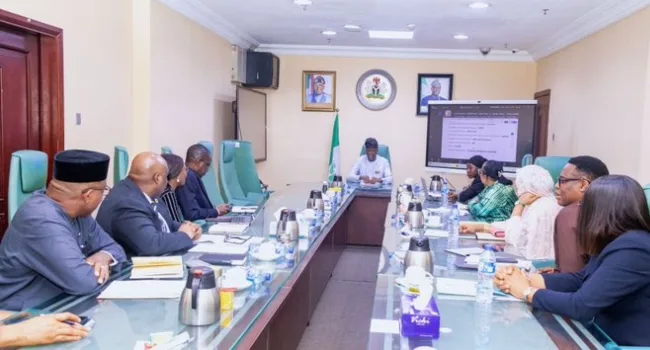The Federal Executive Council (FEC) has directed the full implementation of the Naira-for-Crude policy with local refiners, reaffirming its commitment to reducing Nigeria’s dependence on foreign exchange for petroleum-related transactions.
The Ministry of Finance announced the development on Wednesday through an official update titled “Update on the Crude and Refined Product Sales in Naira Initiative” posted on its X (formerly Twitter) handle.
The initial phase of the agreement, which lasted six months and involved the Federal Government, the Nigerian National Petroleum Company (NNPC) Limited, and the Dangote Petroleum Refinery, ended on March 31, 2025. It was not renewed at the time, prompting Dangote to halt refined petroleum product sales in naira.
However, after a key stakeholders’ meeting on Tuesday to assess the initiative’s progress, the federal government clarified that the policy is not a short-term experiment but a long-term strategic move. The aim is to support domestic refining, reduce pressure on Nigeria’s foreign exchange reserves, and strengthen energy security.
In the statement, the Ministry of Finance explained that the initiative mandates crude oil and refined product transactions in naira, not foreign currency. This, it said, would help stabilize the exchange rate, reduce demand for dollars in the domestic petroleum market, and encourage sustained investment in Nigeria’s refining sector.
While the government acknowledged that such a major policy shift could face implementation challenges, it assured that these issues are being addressed in real time through collaborative efforts among key institutions.
The Tuesday meeting was attended by the Minister of Finance and Coordinating Minister of the Economy, Wale Edun, who chairs the Implementation Committee. Also present were the Executive Chairman of the Federal Inland Revenue Service (FIRS), Zacch Adedeji, who chairs the Technical Sub-Committee, and senior representatives from NNPC Limited, Dangote Refinery, the Central Bank of Nigeria, the Nigerian Ports Authority, the Nigerian Upstream Petroleum Regulatory Commission, the Nigerian Midstream and Downstream Petroleum Regulatory Authority, and Afreximbank, among others.
The federal government emphasized that the initiative would remain in place as long as it serves the public interest and aligns with broader national economic objectives. It also announced plans to expand the framework over time to further enhance energy resilience and economic sovereignty.


